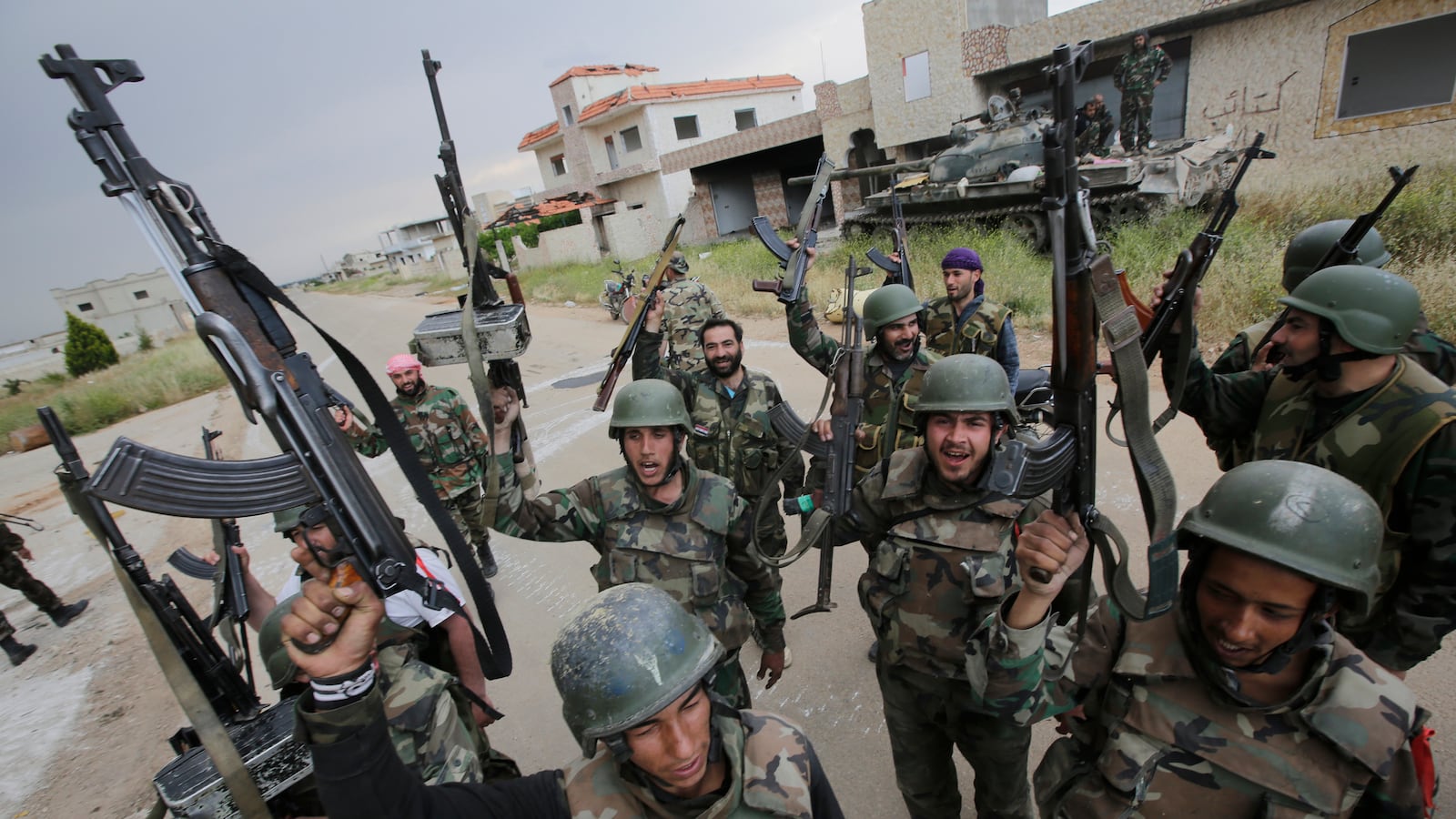Despite President Obama’s assertion on Thursday that he reserves “the options of taking additional steps, both diplomatic and military,” foreign intervention in Syria seems a distant prospect, and that, along with a string of military successes, has fueled the perception that president Bashar al-Assad now has the upper hand in his country’s bloody civil war. As Republican Sen. John McCain bluntly put it this week: "Right now, Bashar al-Assad is winning."

During the last few months, the Syrian military have retaken strategic areas across the country, reopening supply lines in the north and south while ramping up its offensive in the western city of Homs, a critical gateway between Damascus and the coast. Assad’s forces have also reinforced their strongholds in Damascus and elsewhere while weathering what rebels had billed as a major offensive in the capital.
Now Assad—whose impending demise was predicted by opponents both at home and abroad after rebels brought the war to Damascus and the commercial capital of Aleppo this summer—seems to be enjoying some unexpected momentum. On his visit to Washington this week, British Prime Minister David Cameron said that the idea of the rebels resolving the conflict by force “is not looking promising.”
Cameron and the Obama administration, meanwhile, have renewed calls for a diplomatic solution in Syria—showing that despite pressure to act on Assad’s alleged use of chemical weapons, America and its allies “aren’t going anywhere in a rush,” says Shashank Joshi of the Royal United Services Institute in London. “This is the best month [Assad] has had in a while,” Joshi says. “Undoubtedly, we underestimated his resilience.”
But while Assad’s recent success may show his staying power, analysts tracking the conflict say it also signals that he has scaled back his goals—from retaking full control of Syria to simply keeping the balance tilted his way in a brutal and drawn out war.
Assad’s forces have moved “from a counter-insurgency strategy to one that recognizes that they are in a civil war,” says Joseph Holliday, a fellow at the Institute for the Study of War in Washington, DC and former U.S. Army intelligence officer. The shift would mean that Assad is abandoning his bid to crush the rebellion and concentrating instead on the war’s vital fronts—which may have sparked the recent surge in tactical gains. “The regime just decided to stop contesting parts of the country,” Holliday says. “What they’re doing is saying we are going to focus our resources on areas that are strategically important to us.”
Assad may have the advantage in waging this type of war. While his military has been badly weakened, it still has the ability to control its strongholds—and to keep the rebels out-gunned. Assad’s two main allies, Iran and the Lebanese militant group Hezbollah, have been keeping Assad well-supplied, with the latter reportedly sending fighters to critical areas like Homs and the former providing military trainers and arms. Assad has also reinforced his ranks with paramilitary groups.
The rebels, on the other hand, remain hampered by internal divisions and unreliable support, which they piece together from private donors and allies such as Saudi Arabia and Qatar. “It’s just not as consistent or as clear as what the regime is getting from Iran on a daily basis,” Holliday says. “As this becomes a conflict of warring militias, the reality is that the regime and its militias are going to be the biggest ones out there for a very long time.”
Some analysts warn that as the war heads down this path, it will become more sectarian—fears that spiked after reports of mass killings by Assad forces earlier this month in the coastal province of Tartous. The victims were from the country’s Sunni majority; Assad hails from the Alawite sect, an off-shoot of Shiite Islam that makes up 12 percent of Syria’s population but forms the backbone of his support. Iran and Hezbollah, both Shiite, see Assad as a bulwark against Sunni influence. “He’s now entering phase two of his campaign,” says Michael Weiss, a Syria analyst and columnist with NOW Lebanon. “A conventional military campaign is being replaced by an Iranian-funded and trained sectarian militia, backed by Hezbollah.”
There are many areas of Syria, Weiss notes, that seem lost to Assad—such as Aleppo and the northwestern province of Idlib, which borders Turkey and has been a crucial rebel supply route. “The regime can’t ‘win’ all of Syria,” Weiss says. “But it can and will retake that vital corridor from Damascus to Homs to the coast […] to keep a supply-chain running between the capital and [Hezbollah in] Lebanon, and to keep the ports and regional airports operational for resupplies from Russia and Iran.”
The Obama administration has argued that a political solution is the best way to end the conflict—and both America and Russia, which has backed Assad throughout the uprising, are putting their weight behind a peace conference to be held in Geneva next month. (A similar conference last year put forward a peace plan that both sides have ignored.)
The Syrian opposition has demanded that Assad step down as part of any negotiated transition. But Amr al-Azm, a professor at Shawnee State University in Ohio and former adviser to the Syrian government, says Assad seems intent on forging ahead—and may even be eyeing the presidential elections scheduled for next year. “Their position [in negotiations] is not going to change because the regime’s own calculus has changed,” he says. “Six months ago their idea of victory was to crush the opposition. Now it’s probably the survival of Bashar al-Assad until 2014.”






